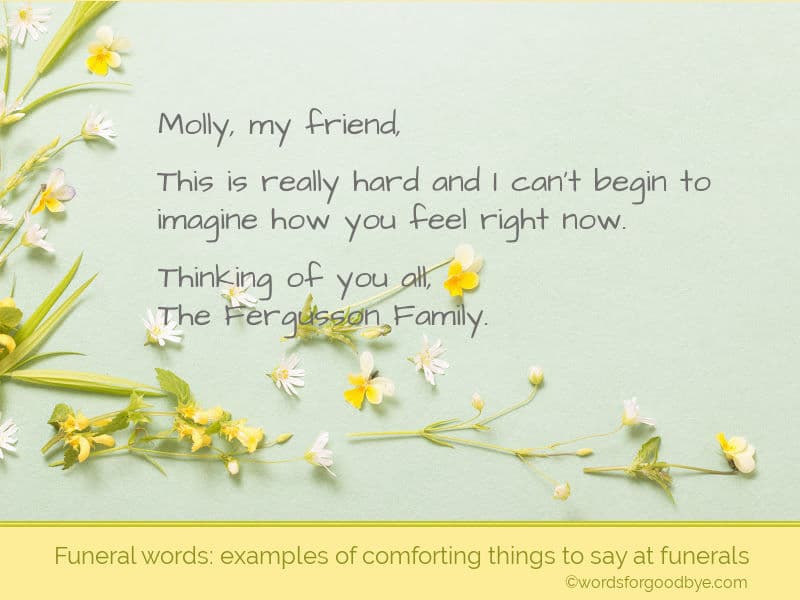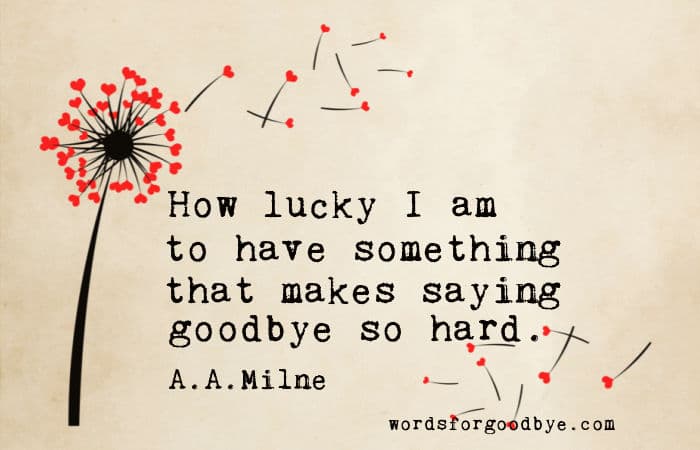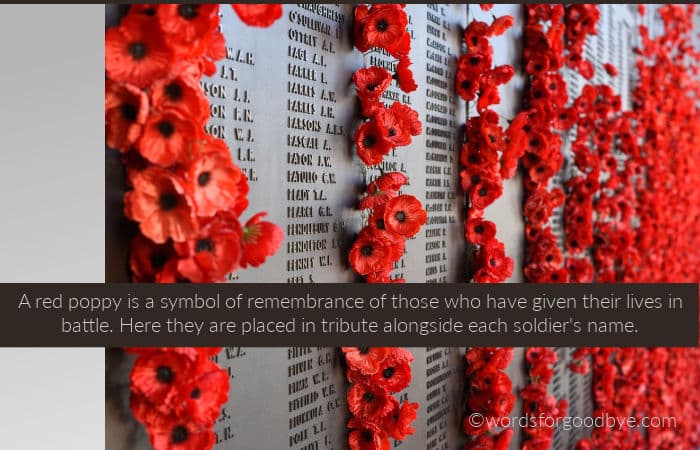- HOME ›
- How to write a memorial ›
- Funeral words: how to speak to the bereaved
Funeral words: examples of comforting things to say at funerals
How to avoid using platitudes and to say something meaningful, honest, and kind.
By: Susan Dugdale
What words do you say at a funeral? Why do we find it hard to talk to someone when someone close to them dies?
There are lots of reasons. Some of them are selfish. For instance, death reminds us of our own mortality and we get caught up in our own vulnerabilities and feelings. Or death is inconvenient. It’s appearance can force rearrangements of long held plans at a moment’s notice.

Selfishness aside, others reasons are because we don’t want to offend by saying the wrong words, or to callously highlight or underline the fact by being too blunt.
What's on this page:
- Talking on tiptoe: using euphemisms
- Examples of comforting things to say at a funeral
- 4 simple, sincere and brief things to say
- 4 ways to use stories, memories and personal attributes
- Words to say when you don't personally know the deceased
- If there is anything I do... how to offer practical help
- Listening: one of the most comforting things we can offer
- Please say something, rather than nothing
- Platitudes, clichés and other things best left unsaid
Talking on tiptoe: using euphemisms
Instead of being direct we talk on tiptoe. We use euphemisms and platitudes in an attempt to soften death’s impact on those affected, including ourselves. Phrases like 'slipped away' or 'lost the battle' are intended to cushion the bereaved from the shock.
Do they work? Do they make a grieving person feel better?
Having been on the receiving end of them several times, I say, no. Not really. Please avoid clichés. Keep what you say true to you, your relationship with the deceased, and real.
For instance, when my brother died, I didn’t want to hear that God needed another angel.* He was most definitely not one! And I did not want to make a list of all the things I should be grateful for to put the pain of his death in perspective, right after his service. Neither did he PASS on – as if he went by me in the street without stopping to say hello.
He did not buy the farm, cash in his chips, reach the end of the line, give up the ghost or get lost.
He died. Suddenly.
If you’re talking to someone newly bereaved, you don’t need euphemisms or platitudes. You don’t need ‘a stiff upper lip’, forced brightness or to use ‘carefully solemn’ words you wouldn’t use normally. You need honesty, delivered with kindness and respect.
*Please be mindful with
religious references. Phrases like ‘going home’, ‘meeting
one’s maker’, or ‘joining Jesus’ are only a comfort if the
beliefs they support are mutually shared.
Examples of comforting things to say at a funeral
Park the platitudes to one side and have a play with these suggestions. Try them out loud and adapt them, to make them your own.
(Any of these ideas would work equally well in a text or a card.)
4 simple, sincere and brief things to say
If you can't pull more than a few words together, try these. Although they are brief, they express what is most important: that you're thinking about the bereaved and that you care.
- I’m struggling to find right words to say. Just know that I care.
- I am so sorry for
your loss. We’ve been thinking about you.
- This is really hard.
I can’t begin to imagine how you feel right now.
- I can’t take this away from you, but I can give you a hug, if you want one.
4 ways to use stories, memories and personal attributes
Letting the person, or people, closest to the deceased know how much you appreciated aspects of their character, the little habitual things they did, or sharing a story is always welcome. It's affirming and comforting to hear how their loved person was seen and valued by others.
Insert what you need inside the brackets to make the sentences work for you. When you've finished adapting them, read them out loud to make sure they say what you want them to and, that they make sense.
Under each example there are two more examples to illustrate how the sentences can be adapted to fit your needs.
- I loved the way your [Dad, sister, brother, son, daughter...] [smiled, laughed, was kind...] [He/she/they] was a really good person to be around.
I loved the way your Dad smiled and always made time to have a personal conversation with me when I came over to your house, even when he was super busy. He was a really good person to be around. I know you'll miss him.
I loved the way your brother laughed. It was utterly contagious. He found the funny side in everything. He was a really good person to be around. - I want you to know just how much [your brother, sister..., name of person] helped us by [insert example]. [His/her/their] willingness to step up was always appreciated and will be missed.
I want you to know just how much your sister helped us. Our Community Law Service relies on pro bono work and Ada went above and beyond. She was absolutely tireless in her commitment. Her willingness to step up is for ever appreciated and will be missed.
I want you know just how much Sam helped us with our plan to establish the city's first e-waste and recycling center. It officially opened last month and we couldn't have done it without his expertise. His willingness to step up is truly appreciated and will be missed. - My all time favorite memory of [name of person] is...[insert memory]. There’s many more stories and memories where that one came from. Perhaps we can share a few another time.
A favorite memory of your brother is the time he decided to make himself a hot milk drink when were kids. I came into the kitchen to find he'd exercised excellent but unfortunately flawed logic. Water is boiled in electric kettles. Not milk. The mess and the stench was truly stupendous. There’s many more stories and memories where that one came from. Perhaps we can share a few another time.
My all time favorite memory of your Mother goes back to when you were born. I went to visit her while she was still in hospital after your birth. I remember seeing her before she saw me. She was standing at the foot of the bed cradling you, crooning. It was beautiful. There’s many more stories and memories where that one came from. Perhaps we can share a few another time. - [Name of person} will always be an inspiration to me. Regardless of how difficult a situation or a person was, [he/she/they] knew how to focus on the positive and that brought the best out in everyone.
Jan will always be an inspiration to me. Regardless of how difficult and damaged many of her students were, she always managed to find and nurture their abilities.
Your Dad will always be an inspiration to me. I know when he was a child he lived in China during Mao Zedong's brutally ruthless Cultural Revolution and witnessed appalling events. Despite that, he unfailingly looked for the best in people. Including me.
Words to say when you don't personally know the deceased
There will be times when we go to a funeral principally to support a friend, a colleague or family member who has had someone very close to them die. What we know about the deceased mainly comes through our relationship with them rather than through direct experience. To be comforting the words we say need to reflect the positive aspects of what we've heard and observed.
For example:
I remember the stories you'd tell about the weekends you spent at your Grandmother's. You obviously loved her very much and will miss her a lot.
We could see how important it was to you to have the support and esteem of a mentor like Don. The respect and admiration you had for him was apparent in the way you spoke about him. I know you'll miss his advice and wisdom.
If there is anything I do...How to offer practical help
One of the things frequently said is: 'If there anything I can do, please let me know'. Because it's generalized and because it puts the onus on the bereaved to ask for assistance, it's seldom picked up on.
If you genuinely want to help be specific about what you're able and willing to offer. And if it's something you know will be useful and welcome, nothing beats just doing it!
Here are three examples of the sort of things you could say:
- I want to be there for you, in whatever way is useful. Here’s a casserole you can re-heat for dinner and I’ll pop in on my way home from work tomorrow to see how you're going.
- We want to do what we can to support you. I can take over your Wednesday morning school run until you're ready to do it again. And Jeb said he'll do the pickup on Thursday afternoons.
- Please don't worry about how you're going to manage everything over the next wee while. That's what you've got friends and family for. Let's talk about what needs doing tomorrow morning. If I come over at 10.30 is that a good time?
Listening: one of the most comforting things we can offer
People process grief in many ways. Some are numbed. Others talk, a lot - going over the same stories again and again.
Offering to listen while being fully present, supportive, and non-judgmental is a valuable, and deeply appreciated gift. You are not expected to fix the situation. You can't but you can make it alright, and safe, for a person to talk.
Here are a couple of suggestions you could use if you'd like to offer your ears and time to actively listen.
- I am here and ready to listen anytime you want to talk. I know
grieving brings up all sorts of emotions: sadness, anger, resentment,
guilt and fear. It’s OK. There is no right way to grieve.
- Here’s my number. Use it. I’ll gladly take your call. I can’t change the situation for you, but I can listen.
What NOT to say to people close to the deceased at a funeral
Please say something, rather than nothing
At the top of my list of what not to say is nothing.
Avoiding saying anything can be hurtful if you’ve previously had a good relationship either with the deceased or those close to them.
I know from experience avoidance usually springs from not knowing what to say. Or from fear of triggering an emotional outburst if you do speak, and then feeling hopelessly inadequate to deal with it.
Therefore, rather than risk the wrong words and possibly a reaction to them, we think the safer option is to offer nothing at all. Sadly, that's a solution without solace for anybody: neither ourselves nor the bereaved.
If this has you been you in the past, please try using some of the suggestions above. You don't need fancy words. Just keep it simple, honest, brief and you'll be fine.
For example: 'I don't know what to say, other than I care.'
Platitudes, clichés and other things best left unsaid
People who've just experienced a profound loss through someone's death are at their most vulnerable and need to be handled with care. The collection below can be easily interpreted as insincere, flippant and disrespectful, even if that's not what was intended.
Words have the power to comfort and support. Please choose them as carefully as you can.
He/she/they is in a better place.
If you genuinely believe the person who has died has gone to a better place, and the person you're talking to also holds that belief, that's comforting. However if the sentiment is not shared, it's meaningless and perhaps also an annoyance.
It was inevitable.
They had it coming.
This is hard and unnecessary. The deceased person may have lived a difficult life however those close to them don't need to be told what they already know.
Time heals all
wounds.
The implication is that you’ll get over it and life will carry on in the way it did before. This is not true. What is, is that in time we grow around the hurt. We accommodate it in the same way a tree heals after losing a branch. The knots it forms around the wound become part its history.
Life must go on.
Yes. That's true. And it is going on. Taking time to honor a death is an essential part of living fully. However what is generally meant when someone uses the expression is the opposite. It implies that enough time and energy have been spent already and that it's time to let the grief go and move on.
Be strong. Other
people need you to get on with living.
This is particularly hard if you have others dependent on you. It could feel as if you're being told your feelings and needs should be put aside. Despite that sometimes being necessary, having your loss and pain acknowledged is important. This could be an opportunity to find practical, supportive things to do to give the person needing to be strong, a rest.
Death is part of
life. It’s the natural order of things. Where there is one, there
is always the other. It’s unavoidable.
Again, this is true. But because it's unavoidable doesn't mean that it should be treated as a routine experience. It's not every day someone close dies. To remind a person grieving that 'Death is part of life' is not helpful.
It was their time.
Some people may be comfortable with the idea of each of us having an finite time allowance making death more acceptable regardless of when and how it occurs. Others are not. This can be a brutally painful suggestion.
Get a grip on
yourself. You’re making others worry, or feel sad.
At best this may come from the 'tough love' department: a desire to shock a person out of their despair through concern for their well-being. Unfortunately, it carries judgmental undertones implying the grieving person is being unreasonably selfish.
If you really want to help, find something practical to do, and do it: mow the lawns, take the dog for a walk, take the children to the park, organize an evening meal roster amongst friends for the next week or more...
Give it a year and
you’ll be better.
Grief does not have a fixed 'finish-by' date. It's not that tidy. You may sincerely want the person to feel better but the implication that they 'll be back to 'business as usual' in 12 months time is daft. The world has fundamentally changed for them.
They had done all
they needed to do.
This idea supports the notion that we each arrive in the world with a to-do list to get through. Once the items are ticked off we are free to leave. It might be a comforting idea in some situations but it's hellish hard in others. Who are we to know whether a person has a list, is part way through it, or is skipping bits they don't like...? It's tricky best-avoided territory.
You’re still young. You're got time.
The loss of a partner or a child while young is particularly poignant. It's against the natural order of things. Being told you're young is not consoling. True, there may be another partner or another child in the future. But right now, this partner, or this child has been wrenched from life. They can never be replicated. There is only ever one of a person.
You only get what
you can handle.
This is frequently said to encourage a person to believe they have the strength to meet whatever befalls them, including the death, usually in difficult or tragic circumstances, of someone close. As an idea it presupposes there's some sort of behind-the-scenes monitoring happening to manage the flow of events.
For example: she can handle losing her job because of Covid, her house being under threat of foreclosure and her grandmother, dying suddenly. She's a very strong woman.
The more you get, the more you are supposedly equipped to handle. The less you get, the less you are able to cope with.
It was God’s will . God wanted them.
If you and the bereaved believe God exists and that They have complete control over who arrives on earth, who departs and when, this may be comforting. If the belief is not mutual it's likely to be an irritation. Be careful.
It was for the best.
For whom? This is an opinion that may not be shared, or welcome, regardless of the circumstances surrounding the death of someone.
At least he didn’t suffer, at least he died doing what he loved, at least he managed to celebrate Christmas with you all, at least you have another child, at least you're young, at least you had 20 good years together...
Any sentence beginning with the words 'At least' needs thinking through a little more. What are you really saying? Is it kind? Respectful? Necessary? If it were you in a similar position would you appreciate the sentiment? Maybe not.
I know how you feel... and then talking about yourself and your experience of grieving. You are supposed to be giving comfort, not reliving your own experiences and making yourself the focus of attention.
The enduring impact of words
And please don't say something similar to what I was told as a girl after my father died suddenly.
I was 13 years old with four younger siblings. I remember where I was, what I was doing and who said it.
I was in the bathroom washing my face when the door was suddenly opened by our family doctor who had been called to calm my distraught Mother.
He said, “You have to grow up fast. Your Mother needs you to set an example and to take care of the little ones.”
I know he didn’t mean to be unkind. It was a tense very difficult situation and my Mother needed help. However his words echoed on for a long, long time.
Other useful resources:
Where do our sayings for death and dying come from? - an excellent article about why and how we use euphemisms from mariecurie.org.uk


